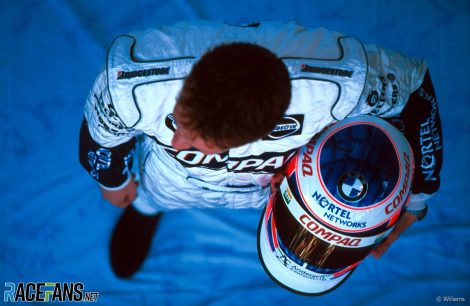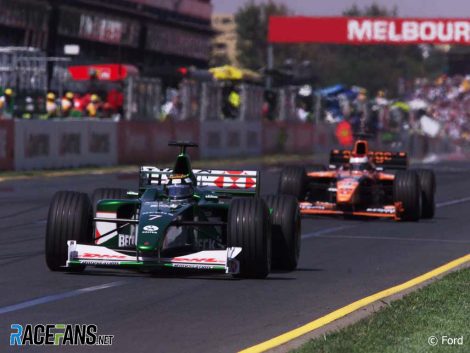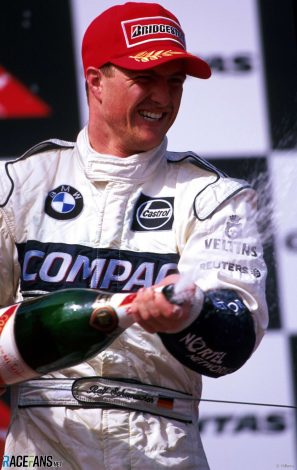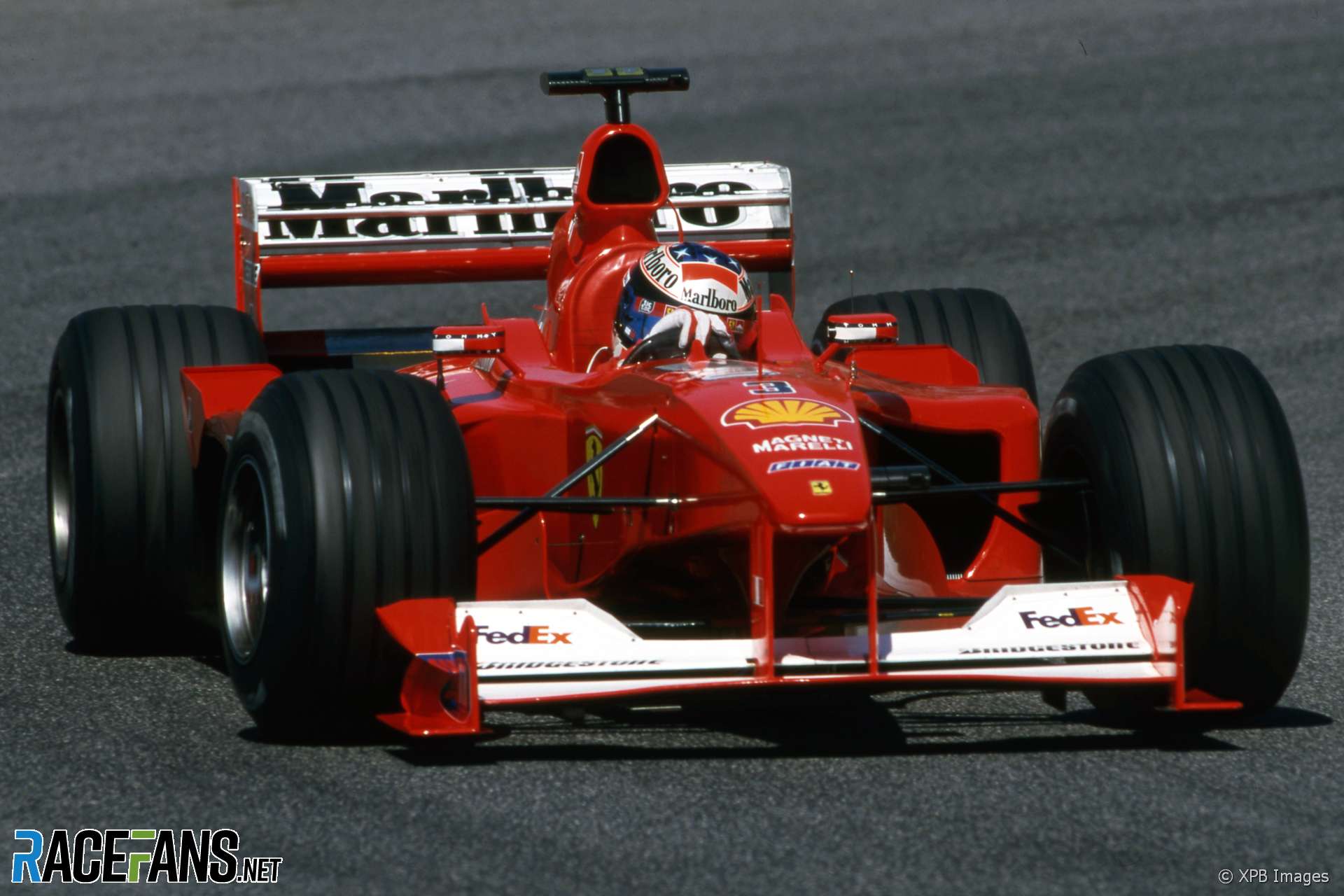As Formula 1 began its first championship of the new millennium (or, to be pedantically correct, the last one of the previous millennium), most anticipated the season would see a continuation of the rivalry which had defined the last two years.
Mika Hakkinen had won the drivers’ championship at Michael Schumacher’s expense in the previous two seasons. But a mid-season crash at Silverstone had robbed Schumacher of the chance to push his rival to the final rounds.With Schumacher back to full fitness for the new season, and Ferrari buoyed by their 1999 constructors’ championship triumph which delivered their first title for 16 years, Tifosi hopes were high the team would produce its first drivers’ title winner since Jody Scheckter in 1979.
For his fifth season in red, Schumacher was partnered for the first time by Rubens Barrichello. He slotted into the seat previously occupied by Eddie Irvine, and if Barrichello didn’t immediately see himself as Schumacher’s designated number two, the coming seasons would disabuse him of that notion.
At McLaren, Hakkinen was seeking a third successive title, after his injury-assisted triumph the year before. Alongside him David Coulthard who entered the season with renewed vigour and a commitment to better balance the racing and promotional demands of an F1 driver. Powered by the Mercedes engine and Ron Dennis’ trademark japery, McLaren were arguably still the team to beat.

Elsewhere on the grid, Benetton kept Alex Wurz and Giancarlo Fisichella, while Flavio Briatore returned to lead the team he’d taken to title success with Schumacher in the mid-nineties, in preparation for Renault’s full-time return to F1. Unnoticed by anyone except Jos Verstappen’s agent, Tora Takagi left F1, his seat at Arrows being filled by the father to then two-year-old Max. Pedro de la Rosa continued alongside him, and the team’s once empty sidepods were now occupied by a potentially lucrative sponsorship deal from Orange (that’s EE to anyone under 30 years old).
Ford’s purchase of the Stewart team, which had gone from total newcomers to race winners in just three years, was loudly trumpeted as they rebranded it Jaguar and lured Irvine from Ferrari to partner Johnny Herbert. Few imagined the team would not see real success until the global car manufacturing giant sold it to an energy drink brand five years later.
The retirement of 1996 champion Damon Hill had opened up a seat at Jordan for interviewer’s dream Jarno Trulli, with Heinz-Harald Frentzen hoping to build on his superb 1999 season that brought him two victories and third in the championship. The yellow cars retained Mugen-Honda power while 1999 newcomers BAR, despite a point-less debut, had attracted Honda power. The third champion in the field, 1997 title winner Jacques Villeneuve, remained alongside Ricardo Zonta.
At Sauber Pedro Diniz brought the budget, Mika Salo the speed. Formula 3000 Champion Nick Heidfeld gained a promotion to F1 with Alain Prost’s team, partnering veteran Jean Alesi. Whilst last, and certainly least in terms of income and resources, were Minardi, who welcomed debutant Gaston Mazzacane alongside Marc Gene.
2000 Australian Grand Prix qualifying
[smr2020test]Albert Park held the season-opening Australian Grand Prix for the fifth time in 2020, the 5.3-kilometre parkland circuit coming into its own as the curtain raiser. Schumacher was the pace setter during Friday and Saturday practice, raising Ferrari’s expectations for qualifying.
With 60 minutes and 12 laps available to the drivers, for those at the front of the field qualifying would be all about timing track position for clear air and running down the clock for rivals. Those at the rear were more concerned with getting a time inside the 107% limit, though all managed this comfortably in Melbourne.
McLaren locked out the front row with Hakkinen emerging three-tenths quicker than Coulthard. It was arguably Coulthard who decided pole position, a late spin bringing out the red flag and ruining Schumacher’s final run, leaving him third.
At the opposite end of the grid was Button, who had a miserable first Saturday as an F1 driver, qualifying 21st after a sizeable free-practice shunt and engine niggles.
Advert | Become a RaceFans supporter and
Grid
| Position | Driver | Team | Time |
|---|---|---|---|
| 1 | Mika Hakkinen | McLaren | 1’30.556 |
| 2 | David Coulthard | McLaren | 1’30.910 |
| 3 | Michael Schumacher | Ferrari | 1’31.075 |
| 4 | Rubens Barrichello | Ferrari | 1’31.102 |
| 5 | Heinz-Harald Frentzen | Jordan | 1’31.359 |
| 6 | Jarno Trulli | Jordan | 1’31.504 |
| 7 | Eddie Irvine | Jaguar | 1’31.514 |
| 8 | Jacques Villeneuve | BAR | 1’31.968 |
| 9 | Giancarlo Fisichella | Benetton | 1’31.992 |
| 10 | Mika Salo | Sauber | 1’32.018 |
| 11 | Ralf Schumacher | Williams | 1’32.220 |
| 12 | Pedro de la Rosa | Arrows | 1’32.323 |
| 13 | Jos Verstappen | Arrows | 1’32.477 |
| 14 | Alexander Wurz | Benetton | 1’32.775 |
| 15 | Nick Heidfeld | Prost | 1’33.024 |
| 16 | Ricardo Zonta | BAR | 1’33.117 |
| 17 | Jean Alesi | Prost | 1’33.197 |
| 18 | Marc Gene | Minardi | 1’33.261 |
| 19 | Pedro Diniz | Sauber | 1’33.378 |
| 20 | Johnny Herbert | Jaguar | 1’33.638 |
| 21 | Jenson Button | Williams | 1’33.828 |
| 22 | Gaston Mazzacane | Minardi | 1’34.705 |
2000 Australian Grand Prix

Cars were far less reliable 20 years ago. A string of drivers retired from the first race of 2000, leaving just 10 circulating at the flag, with points paid down to sixth place.
As the lights faded the field, except the pit lane-starting Prost of Alesi, charged to turn one, Hakkinen leading the way from Coulthard and Schumacher, the only change inside the top six came as Frentzen moved ahead of Barrichello.
In glorious sunshine, Herbert was the first to fall by the wayside, as parts of the Jaguar’s clutch made a premature bid for freedom. A bad day for the Jaguar team was compounded when Irvine spun to a halt avoiding the crashed Arrows of de la Rosa, which was pitched into the wall following suspension failure – the two stranded cars brought out the Safety Car.
Once racing resumed on lap 10, McLaren’s hopes of starting their season with a one-two were swiftly dashed. Pneumatic valve seal problems on their Mercedes engines put both out. Ron Dennis uncharacteristically responded to this double disaster by scowling.

The pit stops briefly promoted Button from his lowly starting position to fourth. After his pit stop he was running in the final points place – sixth – when engine failure put him out.
Both Jordans were eliminated from proceedings with gearbox glitches. This helped Ralf Schumacher up into third position, behind Schumacher and Barrichello, who began their Ferrari partnership with a dream-one.
Just off the podium was Villeneuve in fourth – easily BAR’s best finish and first points score, ahead of Fisichella and Zonta. Salo originally took sixth on the road, only to lose out in the scrutineering bay due to a bodywork infringement. The only other finisher on the same lap was Wurz in the Benetton, the finishers rounded out by Gene and Heidfeld, one and two laps down respectively.
It may not have been a classic encounter, but for Schumacher and the Ferrari fans 2000 had begun in the best possible way. But McLaren clearly had a potent package, one which promised to keep the championship battle open over the remaining 16 races. The fight would continue two weeks later at Interlagos.
Advert | Become a RaceFans supporter and
Result
| Position | Driver | Team | Laps | Time / laps / reason |
|---|---|---|---|---|
| 1 | Michael Schumacher | Ferrari | 58 | 1:34’01.987 |
| 2 | Rubens Barrichello | Ferrari | 58 | +11.415 |
| 3 | Ralf Schumacher | Williams | 58 | +20.009 |
| 4 | Jacques Villeneuve | BAR | 58 | +44.447 |
| 5 | Giancarlo Fisichella | Benetton | 58 | +45.165 |
| 6 | Ricardo Zonta | BAR | 58 | +46.468 |
| 7 | Alexander Wurz | Benetton | 58 | +46.915 |
| 8 | Marc Gene | Minardi | 57 | +1 lap |
| 9 | Nick Heidfeld | Prost | 56 | +2 laps |
| 10 | Mika Salo | Sauber | 58 | Disqualified |
| 11 | Jenson Button | Williams | 46 | Engine |
| 12 | Pedro Diniz | Sauber | 41 | Transmission |
| 13 | Gaston Mazzacane | Minardi | 40 | Gearbox |
| 14 | Heinz-Harald Frentzen | Jordan | 39 | Hydraulics |
| 15 | Jarno Trulli | Jordan | 35 | Engine |
| 16 | Jean Alesi | Prost | 27 | Hydraulics |
| 17 | Mika Hakkinen | McLaren | 18 | Engine |
| 18 | Jos Verstappen | Arrows | 16 | Suspension |
| 19 | David Coulthard | McLaren | 11 | Engine |
| 20 | Pedro de la Rosa | Arrows | 6 | Suspension |
| 21 | Eddie Irvine | Jaguar | 6 | Spun off |
| 22 | Johnny Herbert | Jaguar | 1 | Clutch |
Go ad-free for just £1 per month
>> Find out more and sign up
2000 Australian Grand Prix championship standings
Over to you
Did you attend this race? Did you watch it in 2000? Share your memories of this grand prix in the comments.
F1 history
- F1’s largest entry, announced 35 years ago today, had twice as many drivers as now
- F1’s 10 longest-running teams – and why most of them have been lost
- What have 10 years of F1’s V6 hybrid turbo era shown us? The naysayers were wrong
- Pictures: The highs and lows of Haas’ eight years under Guenther Steiner
- America’s 10km monster track of the future – and F1’s lost giants of the past





KaIIe (@kaiie)
11th March 2020, 8:44
Yeeees, another retrospective series! Thank you!
I remember getting quite a deja vu from this race: McLaren was the fastest car but also so fragile, much like in the opening race of 1999.
MacLeod (@macleod)
11th March 2020, 13:02
Maybe you notice only 9 cars were still driving of the 22 started. Compared with today those cars were fragile indeed.
GeeMac (@geemac)
11th March 2020, 8:47
Feel the burn Ralf…
cduk_mugello (@cduk_mugello)
11th March 2020, 8:58
I’m so glad you’re covering the 2000 season. I’d watched F1 for years previously but this is probably the first season I remember EVERY detail of and I think is often overlooked.
What I love looking back is that each team has its own identity and completely different branding. That was a really strong era. Looking forward to reading more over the next few months.
Andy (@andycz)
11th March 2020, 9:22
My first full season! Love it!
Euro Brun (@eurobrun)
11th March 2020, 10:02
I lolled so hard at that! Those Orange Arrows looked amazing. I remember at the time being 15 years old and these were immediately my new favourite team! They had some good punch above their weight results too if I remember rightly.
It might be rose tinted goggles, or the influence of the F1 2000 EA Sports game, but that year looked amazing in terms of liveries and a wide range of colours. Each team was distinctive.
OllieJ (@olliej)
11th March 2020, 11:12
I always liked Takagi, so I definitely noticed as well when he lost his seat :P
French Steve (@french-steve)
11th March 2020, 13:37
Top 7 qualifiers had respectively n°1, n°2, n°3, n°4, n°5, n°6, n°7 on theirs cars…
Sensord4notbeingafanboi (@peartree)
11th March 2020, 13:55
Yes, Barrichello, he could have won 5 titles.
DaveW (@dmw)
11th March 2020, 16:26
This is awesome. And I learned the word “japery.”
This may be the only season-long race reporting we are going to get this year.
peter
11th March 2020, 17:04
2019 – 10 sec faster on qualifying..
Peter
11th March 2020, 17:24
One of the greatest myths that has somehow been allowed to cede into fact (and somewhat hinted at here) was that Barrichello was somehow good enough to challenge for number 1 status at Ferrari. His first two seasons at Ferrari were so average given the car he had at his disposal that to think anything else would occur beyond that is fanciful.
Of course such claims were perpetuated by Barrichello’s camp and lapped up by an over zealous British media, a media that had hardly shown much of an appreciation towards Schumacher’s talents and achievements. (But when Barrichello tried to lay on the same claims of favouratism towards Button by Brawn GP midway through 2009, well of course, the British press wouldn’t have any of it.)
Esploratore (@esploratore)
13th March 2020, 1:14
Indeed, I’m not here to criticize barrichello, he was a decent driver, but he had nothing to do with schumacher, nor did irvine, nor did massa, if a driver had proven himself competitive with schumacher, he could’ve become number 1, no one did though, and I’m not saying he really had competitive team mates, if you put an alonso or senna on the same team, we would’ve probably have had great battles and maybe a senna-prost situation, but IMO claims that barrichello and the likes weren’t able to compete cause of number 2 status are laughable when they typically scored 60% of schumacher’s points: a top driver would fare much better, see ricciardo vs vettel or again leclerc now.
Rushfan
11th March 2020, 19:29
Yep, win in as cynical manner as possible, contractually hobble your team mate, get bespoke bridgstone tyres, a bottomless pit of money then deploy as many questionable racing moves as you can. Set a bad example to the lower formulas and rob us of any competition at the front. What a legacy!
Unicron (@unicron2002)
11th March 2020, 20:30
I’m happy to see this series back… But I’d have been even happier to have seen it back a year ago, as 1999 had it all. Schumacher breaks a leg mid-season, Irvine steps up as a championship contender, Frentzen in the beautiful Jordan nearly join the mix at the top, Salo effectively wins a race, Hakkinen crashes twice(!) in Italy, Stewart and Herbert win a chaotic race, I could go on.
But 2000 was pretty cool also, and it’s my favourite bunch of liveries in the 28 seasons I’ve watched.
Esploratore (@esploratore)
13th March 2020, 1:17
I also liked the 2003 season, a rare case where we had 3 team and 1 driver per team battling it out at the top, a bit similar to 2018 except red bull was never really in contention for the title but just for race wins.
Gav
29th March 2020, 15:32
What a load of rubbish.
No one put Barrichello above Schumacher. Nonsense written about the British press as well.